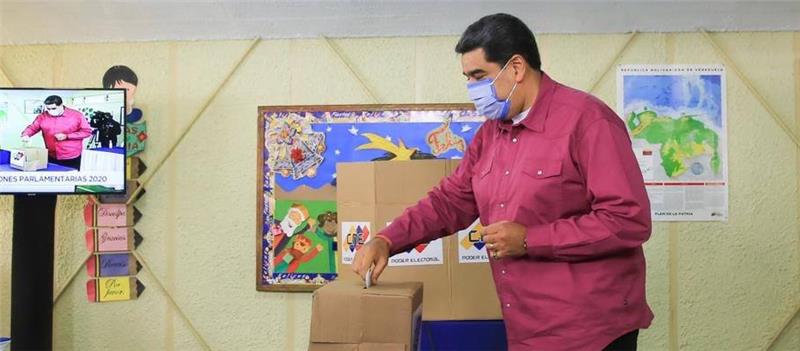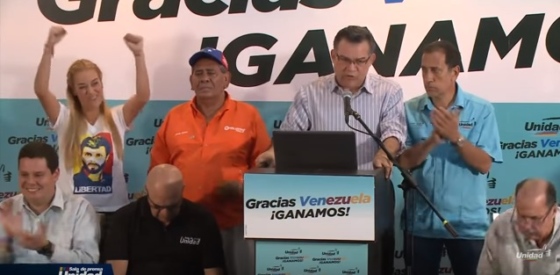What Are Capriles’ Chances of Defeating Chávez in October?
What will be the most important issues of the Venezuelan race? Is the election likely to be free and fair?
A Daily Publication of The Dialogue
Venezuelan President Nicolás Maduro claimed a sweeping victory as his party won control of the National Assembly on Sunday in a vote that the opposition has alleged was rigged in favor of Maduro and his allies and in which the Juan Guaidó-led faction of the opposition refused to participate. How will the election affect Maduro’s hold on power and Venezuela’s opposition? Will the international community maintain its support for Guaidó? How divided is the opposition, and what implications does the split have for its efforts to oust Maduro?
Vanessa Neumann, former Juan Guaidó-appointed Venezuelan ambassador to the United Kingdom: “The parliamentary elections that Venezuelan dictator Nicolás Maduro held on Sunday were not just a fraud, but a farce. The Maduro regime is illegitimate because of its previous electoral fraud in 2018. Since the regime is illegitimate, everything it does is illegitimate. Besides being illegitimate de jure, it was illegitimate de facto. Despite a plethora of threats and inducements, the turnout was a risible 15 percent to 30 percent of the electorate, 30 percent being the dubious number alleged by the regime. The only international observers were acolytes of the Maduro dictatorship, and, notably, one of the key actors in that mission was a former KGB special projects officer, Vladimir Churov. Last but not least, the very exercise committed crimes against humanity by using food as a weapon: Diosdado Cabello and others stated that those who did not participate would not eat. This is a crime against humanity, listed in the report by the U.N. fact-finding mission, the OAS and the International Criminal Court in The Hague. The international community must not be fooled by Sunday’s farce, but it does bode badly: Maduro could be viewed as stronger than ever, prompting some in the opposition to either go to the side of the dictatorship or try to replace Guaidó as leader of the legitimate National Assembly of 2015, whence his constitutional authority as interim president derives, come Jan. 5. With coronavirus and economic downturns around the world, Venezuela’s fighters for democracy risk its allies becoming weary and distracted, while the suffering of Venezuelans deepens and prolongs.”
Carlos Vecchio, Juan Guaidó-appointed Venezuelan ambassador to the United States: “When there is no qualified electoral arbiter, democratic leaders are stripped of their political rights, 350 political prisoners are locked up, parties are hijacked, no qualified international observers are allowed into the country—and when the population, a third of which is undernourished, is threatened with ‘no vote, no food!’ by PSUV Vice President Diosdado Cabello—it’s a misnomer to call this an election. By forcing a fraud, Maduro removed the prospects for a peaceful negotiation. Instead, he jeopardizes Venezuelans’ future and confirms that any solution to the complex humanitarian emergency must address the political situation. He is the root cause of Venezuela’s tragedy and clings to power by perpetrating crimes against humanity, as evidenced by the U.N. Human Rights Council’s Independent Fact-Finding Mission. The international community knows there were no conditions for an election. Indeed, the European Union, the OAS and countries, such as Japan, rejected this farce. In the United States, Venezuela remains a solid bipartisan cause. President Juan Guaidó is president by virtue of article 233 of the constitution, not the result of capricious desire. In the absence of a valid presidential election, the elected president of the National Assembly became the interim president of Venezuela and will remain in that position until free and fair presidential elections are held. The opposition remains united around the objective to secure free and fair presidential and parliamentarian elections. As expected in a broad coalition of democratic forces, there are different views on how to attain these objectives, but none of these views jeopardizes our collective responsibility.”
Marco Rubio, U.S. senator (R-Fla.): “The recent fraudulent electoral process held by the Maduro regime is nothing more than an attempt to silence the voice of interim President Juan Guaidó and the members of Venezuela’s National Assembly. While the Venezuelan people vastly abstained from voting, once more the narco-regime has manipulated the results through an undemocratic and illegitimate process. After years of tyranny and oppression, the Venezuelan people have made their voices heard: it’s time for the dictator to go.”
Luis Vicente León, president of Datanalisis in Caracas: “Venezuela’s parliamentary elections do not represent a significant change in Maduro’s tight grip on power. The National Assembly, which Guaidó heads, has been neutralized since the beginning of his term; it’s a symbolic institution that serves to underpin the political struggle for change but has no influence in the country’s daily life. The opposition-controlled National Assembly did not limit a single action by the Maduro government, as it was replaced by other revolutionary institutions. A new National Assembly controlled by chavismo maintains the concentration of power that already existed, but it also adds two key elements: it validates the institution’s natural legislating function for those allied with the government, and it sharpens the fracture within the opposition. The first quarter of 2021 could be the opposition’s worst moment, as it will be involved in a pitched battle for control of its leadership, in which at least five different groups will participate: 1.) Guaidó reclaiming administrative continuity, despite a lack of electoral legitimacy; 2.) a minority opposition, elected by the new parliament, which, although many consider illegitimate, will become a space for struggle and media exposure; 3.) Henrique Capriles, who will claim what he has said before: a change of strategy and of the opposition’s leadership once it is clear that abstentionism was disappointing; 4.) María Corina Machado, who will return to the attack stating that the G-4 strategy was a sham and who is trying to freeze internal control of those who have failed thus far; and 5.) Primero Justicia, the largest party in parliament, chaired by Guaidó, which, although it participated in the call for a boycott, will claim alternation of the presidency of the National Assembly. With this internal struggle unleashed, the parliamentary vote come to be an anticipated Christmas gift of power consolidation for Maduro.”
Gabriel B. Hetland, assistant professor of Latin American, Caribbean and U.S. Latino Studies at the State University of New York at Albany: “Per official results, nearly 70 percent of Venezuelan voters abstained from the elections. This marks a full reversal from the 2015 parliamentary vote, which saw a record turnout of more than 70 percent. Far from marking a victory for the hardline opposition pushing a boycott, the high abstention rate points to Venezuelans’ disgust with the political options they face: continuation of the monstrous status quo or an incoherent, increasingly divided opposition lacking a positive program. As was widely expected, the results have consolidated Nicolás Maduro’s grip on Venezuela’s political institutions by giving the ruling PSUV supermajority control over the National Assembly. Initial official results give the PSUV 67.7 percent of the vote, the nonboycotting opposition parties 18 percent and the Communist Party (PCV) a dismal 2.7 percent. These results constitute a victory for no one. While the government will gain control of the National Assembly, the low turnout reflects growing dissent, not only among the upper and middle classes, but also among popular classes, which have protested the government with increasing frequency in recent months. Popular disaffection with the PSUV has also led to a growing willingness of small leftist parties to challenge the government, but the PCV’s low vote suggests this strategy has yet to find much traction. Juan Guaidó is a clear loser: on Jan. 5 he will be without any public post within Venezuela, making his implausible claim to Venezuela’s presidency all the harder to sustain. Guaidó may retain some international support, but his appeal among (nonexile) Venezuelans is likely to remain exceedingly low. This reflects the utter failure of Guaidó’s strategy to change the country. The task for the government and the opposition remains the same as it has been for years: to resolve Venezuela’s crisis requires dialogue and negotiations that will allow for the recuperation of political democracy, the end of debilitating and criminal U.S. sanctions, and movement toward a program of economic and social reform that will address the population’s dire situation with immediate, universal aid and a sustainable program of economic recovery. Unfortunately, none of this appears to be on the immediate horizon.”
Geoff Ramsey, director for Venezuela at the Washington Office on Latin America: “Venezuela’s legislative elections were held Sunday amid deep irregularities, and around 70 percent of voters abstained. We need to be clear: this was not a free and fair vote. But it’s equally as important to understand how we got here, and how the Trump administration’s missteps have once again failed the Venezuelan people. Rather than just sitting these elections out, a coalition of opposition voices tried to pressure Maduro to hold a clean vote. In September, they succeeded in getting the regime to pardon more than 100 dissidents and to request international observation from the European Union and United Nations. The European Union even sent a mission to Caracas to encourage this deal, after first getting support from the European and Latin American members of the International Contact Group on Venezuela. However, these efforts were undercut by a White House that does not believe in multilateralism. The Trump administration attacked the European diplomats and accused the European Union of engaging in ‘cowboy diplomacy.’ With the United States actively undermining them, negotiations fell through. This is par for the course for the Trump administration. Last year’s talks, facilitated by Norway, also collapsed after the White House pulled the rug out from under opposition negotiators. This is a lesson for the incoming Biden administration, which should be actively working to make one thing clear: the only way out of this crisis is a negotiated solution—and Biden will need to demonstrate that it is in Maduro’s interest to return to the table.”
 The Latin America Advisor features Q&A from leaders in politics, economics, and finance every business day. It is available to members of the Dialogue’s Corporate Program and others by subscription.
The Latin America Advisor features Q&A from leaders in politics, economics, and finance every business day. It is available to members of the Dialogue’s Corporate Program and others by subscription.
What will be the most important issues of the Venezuelan race? Is the election likely to be free and fair?
The best scenario for Chávez is to distribute resources again by increasing funding to social programs or misiones.
What do the election results mean for President Nicolás Maduro and his grip on the presidency?
 Venezuelan President Nicolás Maduro casting his vote in the Dec. 6 parliamentary elections. // Photo: Venezuelan Government.
Venezuelan President Nicolás Maduro casting his vote in the Dec. 6 parliamentary elections. // Photo: Venezuelan Government.
